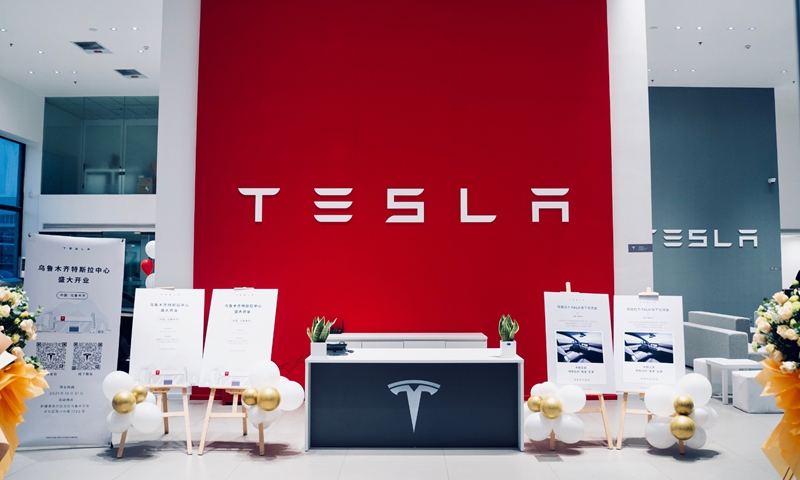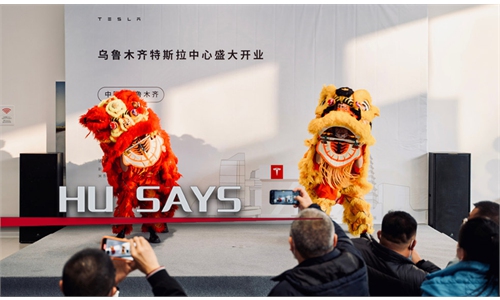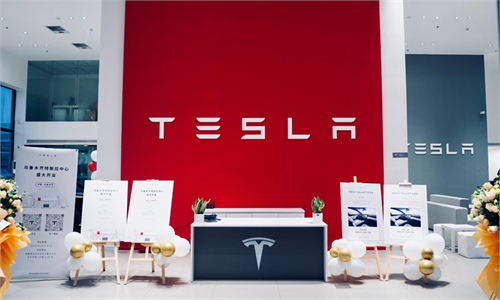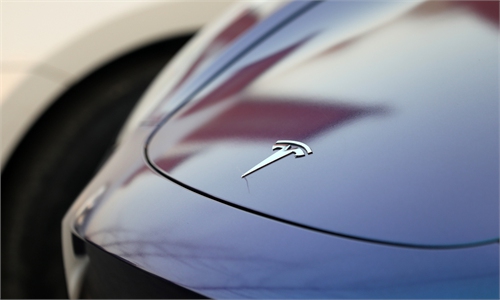
Showroom of Tesla in Urumqi, Northwest China's Xinjiang Uygur Autonomous Region Photo: Weibo account of Tesla
Tesla, an American company, is drawing criticism from its "American fellows" recently after it opened a showroom in China's Xinjiang Uygur Autonomous Region. White House Press Secretary Jen Psaki said the private sector should oppose "human rights abuses and genocide in Xinjiang," and warned that Tesla faces "serious legal, reputational, and customer risk."Psaki's "guidance" on the American company has no rigorous legal or moral logic. In essence, it's a threat the government issued toward an enterprise. This is also related to the previous US move of signing into law the so-called Uyghur Forced Labor Prevention Act. On this normal business move of Tesla, Senator Marco Rubio, who introduced the legislation, immediately expressed his anger on Twitter. The bottomless and immoral attacks on China are quickly spreading across Washington like the Omicron is doing. It's fair to say this is a kind of political depravity.
The so-called Uyghur Forced Labor Prevention Act is an evil domestic law based on lies. Multinational companies operating in China are not obliged to abide by it at all. Tesla opened a showroom in Xinjiang to sell vehicles, which has nothing to do with using "forced labor" within their supply chains. The reason why Rubio and the White House were irritated is not that Tesla violated the Act, but that when the US is rallying various forces to engage in a crackdown on Xinjiang, Tesla acts as a "contrarian" going against Washington's wishes.
This has not only made Washington lose face, but is also related to Washington's ill-intentioned plot of "using Xinjiang to check China." The US has fabricated a "horrific" story about Xinjiang, and all its crackdowns are based on this absurd story. But if Tesla develops well in Xinjiang, it will open a window for the international community to understand the real situation in Xinjiang. Just like a small needle can easily pierce a big balloon, the more people know the truth of Xinjiang, the more difficult it will be for Washington to continue its political scheme. Therefore, Washington threatened and intimidated Tesla to create a terrifying atmosphere to deter the emergence of more "contrarians." But this high-profile political gesture is a kind of extreme diffidence.
As an American company, Tesla has achieved great success in Chinese market. This shows that there is huge space for mutually beneficial cooperation between China and the US in trade and commerce. Tesla has opened 211 stores in the Chinese mainland in 60 cities. The company has been one of the most shorted stocks on Wall Street, and Musk almost shed tears several times. It was Shanghai that offered him an olive branch at his most difficult time. Tesla's Shanghai Gigafactory has delivered 413,283 vehicles as of November 2021, accounting for nearly half of Tesla's total car deliveries in 2021. Isn't such a fact more powerful and telling than the slogans of Washington politicians?
The fact that Tesla has opened a showroom in Xinjiang also reflects the openness and confidence of Xinjiang and even China. Despite having several domestic EV brands, China has not raised the market entry barriers to keep foreign companies like Tesla out. China's EV brands are competing with Tesla and all of them have won their market share. Now, if Washington really forces Tesla to close the store, it will become a big scandal for the US and Tesla. And China won't be the one who hurts when the US cuts itself.
Washington often accuses others of using politics to interfere in market behavior. However, now it's starting to do the same regardless of rules. Today, the US is having difficulties fighting the laws of economics. It hopes to use political power and ideology to shape concerns in science and technology, and artificially guide or force companies to make choices that deviate from the laws of business. In this way, the US imagines that one day a "high-tech alliance" that excludes China will be established. We cannot help but feel that the US really is not confident anymore, and that it is destined to have a hard time against the general trend.
People have seen that the rapid growth of China's competitiveness has torn off Americans' veil of hypocrisy, and the US is gradually losing confidence to compete with China squarely and fairly. It keeps making up lies to attack and smear China, forces its allies and multinational enterprises to take sides, and become "stuck in the middle." But how long can this hegemony that is against the trend of the times last?



